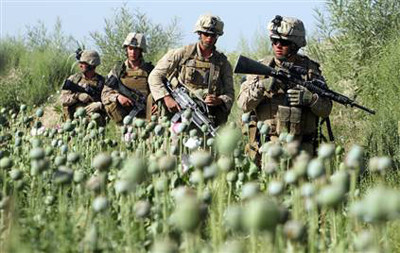By Haider Rizvi

Despite the heavy military presence of the United States and other Western powers, Afghanistan remains the world's largest illicit producer of opium. Photo: David Guttenfelder/AP
Despite the heavy military presence of the United States and other Western powers, Afghanistan remains the world's largest illicit producer of opium, according to a new study released by experts who monitor the worldwide trade in narcotics on behalf of the United Nations.
"Afghanistan is the source of over 90 percent of the illicit opium in the world," Mylven Levitsky, a member of the International Narcotics Control Board (INCB), told a news conference after releasing the board's latest study on the global trade in illicit drugs.
Levitsky, who thinks that lack of security is the "main obstacle" to halting opium production in Afghanistan, urged the U.S.-backed authorities in Kabul to take "immediate measures" to address the drug problem, which he and his colleagues have described as "alarming".
According to the INCB 2008 report, Afghanistan is currently producing over 7,000 tonnes of opium. Mixed with certain chemicals, opium is used to manufacture heroin, a highly addictive drug that remains popular with millions of users around the world.
The report shows that in addition to the illicit cultivation, manufacture and export of heroin, Afghanistan is also facing the problem of drug abuse at the domestic level. Researchers say drug abuse is on the rise in Afghanistan, with at least one million people currently addicted to heroin.
The INCB study points out that the large-scale smuggling of Afghan opiates is also causing a wide range of social ills, including organised crime and corruption, which according to some unconfirmed reports, are also linked to the authorities in Kabul and their allies among warlords.
Opium is not the only illicit crop in Afghanistan. According to the report's authors, in 2008, cannabis cultivation was also on the rise because that crop is now considered to be highly lucrative in the international narcotic drug market.
Afghanistan has been a leading source of heroin exports to the Western world for nearly three decades. In the early 1980s when the United States and the former Soviet Union turned the country into a battleground for their proxy war, the heroin business was linked to the anti-Soviet Islamist forces backed by the U.S. intelligence agencies.
According to the report, illicit poppy cultivation is also taking place in neighbouring Pakistan, which appears to be increasing. "While the government of Pakistan remains determined to eradicate such illicit cultivation, most of it takes place in areas near the Afghan border where it has difficulties in enforcing national laws," Levitsky said.
The Afghan government needs to create alternative income sources for poppy growers, but it must also take measures to control the supply of chemicals that are used to convert opium into heroin, officials said.
In a recent interview with IPS, an INCB said the board was trying to identify the pharmaceutical companies responsible for exporting those chemicals, but the 2008 report does not give any indication of success in that regard.
...
The report's authors urged the United States to take effective measures to stop the use of illicit drugs, noting that violence among drug cartels, traffickers, and law enforcement officials was becoming a "major problem" in many parts of the country.
With regard to Africa, the study shows that the western part of the continent has now become a major hub for South American smugglers to ship their products to Europe.
The study finds that cannabis has become the most popular drug in Africa, with at least 42 million users. Africa produces more than 25 percent of all cannabis worldwide.
In their conclusion, the report's authors urged governments to adopt "coherent" and "constructive" plans to address the issue of illicit trade in narcotic drugs rather than seeking "individual solutions".



